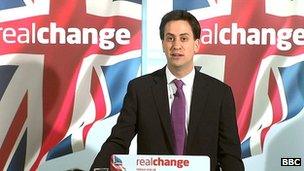Challenger banks: Why breaking up will be hard to do
- Published

Ed Miliband wants big banks to be broken up
If you've lost faith with your bank because you blame it for the financial crisis, or are upset with corporate greed, or have just had enough of their IT problems, you don't really have many alternatives.
The UK's biggest five banks - Barclays, Lloyds, HSBC, RBS and Santander - dominate the marketplace. Excluding Santander, the other four banks together have 85% of the personal current account market.
Labour leader Ed Miliband wants to reshape the banking landscape. He is calling for existing banks to be forced to sell off hundreds of branches, thereby increasing the number of main UK banks by adding at least two new "challenger" banks.
Mr Miliband's view is that more banking competition would lead to more consumer choice and ultimately lower charges.
The UK did once have a much more diverse banking landscape. But wholesale demutualisation of building societies in the 1990s, together with the subsequent 2008 financial crisis, has seen many of the mutuals and the competition that went with them disappear as they were absorbed into bigger companies.
Last month, business secretary Vince Cable described the building societies' demutualisation as "one of the greatest acts of economic vandalism in modern times", leading to commercial banks "abandoning locally based relationship banking in the decade before the recent financial crisis".
Britain now has just 47 building societies, from the biggest - Nationwide and the Yorkshire - to small, local societies that have only a few thousand members. That's a far cry from the 481 that existed in 1970.
To get back to this level of banking variety, observers say actions will need to go a lot further than Mr Miliband has suggested.
Ambition required
Lydia Prieg, a senior researcher at independent think-tank the New Economics Foundation and former banker at Goldman Sachs, says even if the proposals are implemented, the UK landscape will not change fundamentally.
"We need to be much more ambitious. It is not just about increasing the number of banks, but increasing the different kinds of banks," she says.
According to Ms Prieg, the UK is an international anomaly. In Canada, Germany, France and Austria, to name but a few, different kinds of institutions thrive, including:
co-operative banks, owned and managed by the people who work there,
mutuals, owned and run for the benefit of their members,
and credit unions, member-owned financial firms.
The different kinds of ownership structures of such banks create different behaviour incentives, according to Ms Prieg.

The banking landscape could be about to change
"Our banks are listed on the stock exchange, which means they are focused on the latest quarter to maximise shareholder returns. Whereas a credit union is a local bank with a specific mandate, in sync with local members. It's relationship banking."
Ms Prieg suggests that the government could dramatically increase the market share of these kinds of banks by forcing two High Street giants - RBS and Lloyds Banking Group, in which the government holds significant stakes following the financial crisis - to sell off their branches completely.
Disgruntled customers
But with the government showing little inclination to take this kind of action, most analysts believe the impact of existing building societies and more recent upstarts, such as Virgin Money, remains limited.
"I don't expect the challenger banks to have a meaningful impact for the prices and services of existing banks," says Investec banking analyst Ian Gordon.
Mr Gordon also points out that customer inertia remains a major issue, with most customers opting to remain with the same bank they started out with, however poor the service.
But there are signs that the recent spate of banking scandals is prompting disgruntled customers to finally vote with their feet.
Two separate issues have put banks and the services they offer firmly in the spotlight. Firstly, the software update at NatWest which saw customers denied access to core services. And secondly, Barclays' payment of a £290m fine for allegedly fixing the London interbank lending rate (Libor), which underpins trillions of pounds' worth of loans.
Last Friday, the Co-op reported a 48% increase in online current account applications for the past two weeks compared to the previous two weeks.
Nationwide says it has seen a 45% rise in people transferring their main account to the Society in the past fortnight. Meanwhile, the Cumberland Building Society has reported that current account applications are running 50% higher than the normal weekly average.
"Customers now want to think about a different way of doing banking," says Hilary McVitty, head of external affairs for the Building Societies Association.
<bold>Signs of change</bold>
And increasingly there are alternatives on offer. In 2010, Metro Bank became Britain's first new High Street bank in more than 100 years. It now has 10 stores, as it calls them, across greater London.
Co-founder Vernon Hill, who created Commerce Bancorp in 1973, describes Metro Bank's proposition as "local bankers making local loans".
"Small and medium-sized companies in particular want one person who knows their whole business," he says.
On an even smaller scale, Burnley Savings and Loans Ltd officially opened its doors in September 2011. The company was created by David Fishwick, a local entrepreneur who started the firm under the slogan "Bank on Dave!" after finding many of his customers were struggling to obtain loans from their High Street banks.
The firm now issues loans ranging from small personal loans to finance for businesses.
It may be small, but there are signs that the banking landscape is finally shifting once more.
- Published9 July 2012